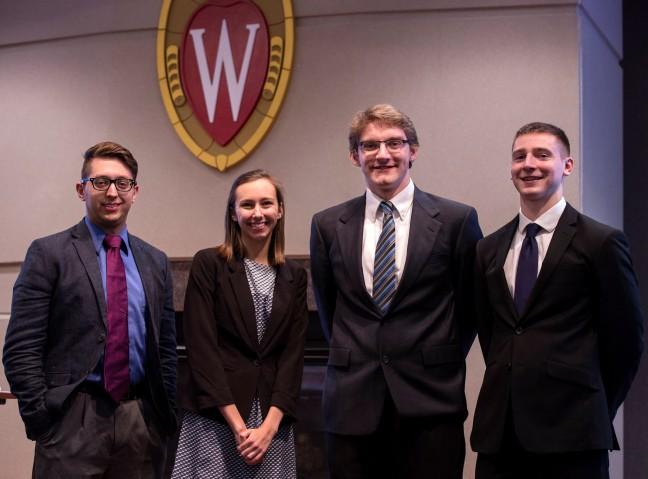There’s an afterlife to every device nowadays, whether that be a dresser drawer or a landfill in some country an ocean away.
According to the United Nations Environment Programme, more than 41 million tons of electronic waste was produced worldwide in 2014, and that number is predicted to rise dramatically in coming years. The Environment Programme also noted that more than 90 percent of the world’s electronic waste is illegally traded or dumped each year.
But three students and one alumnus from University of Wisconsin will head to San Francisco this March to pitch their social enterprise idea, Metrecycle, to tackle the e-waste problem. In the process, they will also be competing for $1 million in startup funding.
This competition is the Hult Prize, sponsored by the Hult International Business School. It is an annual competition that allows students from across the world to enter with their own social startup ideas. This year, the competition received a record number of applicants, topping more than 25,000 submissions.
Former President Bill Clinton sets the annual theme for the competition and this year asked students to create a social enterprise to increase the income of 10 million people dwelling in crowded urban spaces.
With this prompt in mind, the UW team aims to empower people in developing countries by creating a sustainable business model for those living in crowded spaces to see some profits from the proper disposal of e-waste.
“There’s actually a lot of value in the electronics that are being disposed of in high volumes. If you can disassemble the electronics and sort them into different streams, you derive a lot of value from the commodities inside such as precious metals,” team member Alex Valaitis,a senior double majoring in computer science and economics, said.
Team member and UW alum Luke van den Langenberg brings his degree in nuclear physics and experience working with WE Conserve, one of the UW’s sustainability departments, to the team. Van den Langenberg said his experiences give him a strong background in e-waste and its hazards. He has also had his hand in the local entrepreneurial scene.
“I really like our team,” van den Langenberg said. “I’ve competed against them in the Burrill, and competed against Jenny in the Qualcomm and Wisconsin Energy and Sustainability Competition. So, I know they all have these passions and skills and really care about these environmental issues.”

The team behind Metrecycle was the key to their advancement to regionals, Angie Peltzer, UW’s Hult Prize campus director, said. She noted their diversity of experience, strong entrepreneurial records and complementary interests as strong indicators of their potential to succeed.
The team is building a prototype of a shipping container with an interior work space outfitted with the tools for the proper disassembly of electronics. The business model is to send the shipping container to crowded, impoverished spaces for their facilitation, Valaitis said.
“I thought to myself, ‘If they can do this in just two weeks, I can’t wait to see what they’ll do in five more months,’” Peltzer said.
In the next few weeks, Valaitis said his team members will be further researching e-waste and the recycling industry with the intention of building a working prototype of a Metrecycle shipping container.
This past week, Metrecycle team members toured at Universal Recycling Technologies in Janesville and met with someone from Cascade Asset Management to look at shipping container design.
Through these tours and meetings, Metrecycle is building out their Board of Advisors, and have received desktops donations for disassemblement practice. And, their business model is getting more sophisticated, Valaitis said. With guidance from these mentors, Metrecycle has decided to add a refurbishing element to their business model. A refurbishing element would be a secondary container dedicated to repairing and reselling electronics to the immediate community.
Now, Metrecyle just needs the funding to send their four team members to San Francisco for the competition, which will take place from March 11-12.
“While it’s important to be a student, what I always say is your learning should begin in the classroom, not end there,” Valaitis said. “The things that are going to separate you in life and what have separated other people who have been successful in the entrepreneurial space, are the things they’ve done when no one else is doing them.”




















